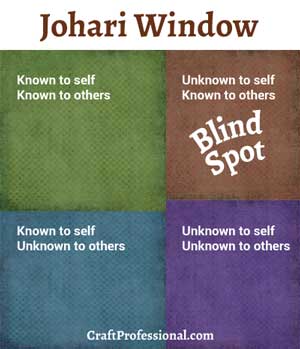What's Holding You Back?
What's holding you back from building your dream craft business? Your blind spot might be the culprit.
We all have blind spots - Those habits and tendencies that we are totally unaware of but others see in us. And often it's those blind spots that hold us back from achieving our goals.
That's why it's wise to make a habit of seeking out constructive criticism to find your blind spots.
It's strange to think that everyone else can know things about you that you don't know about yourself. I'm sure, though, you can think of a time when you've been with someone and wondered if they had any idea how their behavior was perceived by others.
At some point you might have asked yourself:
- Would your constantly bragging relative continue with his behavior if he realized everyone was put off by his brags and people would like him a lot more if he was more humble?
- Would your friend, who is never on time, be more punctual if she knew you often exclude her from outings because you don't want to worry about showing up late?
Those kinds of situations show the "blind spot" in action. Your relative brags because he wants people to be impressed, and he doesn't see that his bragging is actually causing people to think less of him. Your friend doesn't realize her lateness is a huge source of frustration for others even though everyone else knows it.
There's a psychological tool called the Johari Window that can help illustrate the blind spot idea.
The Johari Window model describes things you know or don't know about yourself vs. things other people know or don't know about you. The best way to understand it is to look at a diagram.

Imagine the square on the right contains all of the things that make up your unique self. Each color of square represents a collection of traits, but it's your blind spot, represented by the square in the top right, that we're concerned about.
Your blind spot includes all of the things you don't know about yourself but others are aware of, and those are the things that can really trip you up.
Some Examples of Blind Spot Problems in Business:
Maybe you have a tendency to work on tasks you enjoy and put off those that aren't your favorite. If those disliked and avoided tasks are important for moving your business forward, you could feel like you're working hard but you won't actually be accomplishing the tasks that will help you achieve your goals.
Maybe you have a habit of starting projects without finishing them. Your pile of unfinished business is obvious to those around you, but you don't notice it because you've moved on to the next great thing, and that's where your attention is focused. You could do something great, if only you would settle in and finish it.
If the character traits that are in your blind sport aren't helpful qualities, they can really get in the way of achieving your ambitions. After all, you can't improve something you aren't even aware of in the first place.
The goal is to work on making your blind spot smaller because the more you know about yourself, the better equipped you are to achieve your goals.
Seek Out Constructive Criticism
Because your blind spot is made up of things you don't know about yourself, but others can see, the fastest way to discover what's holding you back is to seek out someone else's input.
Look for someone who is willing to tell you the "difficult truths" you need to hear and is able to do it in a way that makes you feel built up, not torn down. You're not looking for someone who hammers at you to the point that you're not willing or able to listen to their advice no matter how valid it may be. But you also don't want someone who just tells you that you're fabulous and is afraid to say the things that might be tough to hear.
When you find someone who can provide constructive criticism, nurture your relationship with that person. He or she is valuable beyond measure.
You Need to Give Permission To Critique
Before someone is willing to provide constructive criticism, you might have to give them permission. People who are smart, and kind, and have your best interests at heart might hesitate to provide tough feedback because they worry about being hurtful. If you specifically give permission for them to tell you whatever they think you need to hear to improve, you will often get much more detailed and helpful input.
Where to Find Someone Who Will Tell You Difficult Truths
Where you find these people will depend largely on what area of your business you want to improve. Sometimes a friend can fill this role, but often you need to look outside your circle of friends in order to find someone who is willing to tell you the difficult truths.

If you want to improve your skill with your craft, you could look at joining an arts organization, a guild related to your type of craft, or taking courses with a respected teacher.
If you want to improve your business-related skills, look at joining a local small business association, visit the business development office near you and look for ways to connect with people, network with other artists who sell non-competing products, consider working with a business coach, or take a business class if you find a great teacher.
I have worked off and on with a business coach myself, and it is one of the smartest things I've ever done for my business. It is also some of the best money I've ever spent on my business.
My coach has helped me improve issues I never would have seen for myself in a million years. I'm sure I still have my fair share of blind spot issues, but I also know that box is smaller as a result of working with a great mentor who provides excellent, constructive criticism.


New! Comments
Have your say about what you just read! Leave me a comment in the box below.